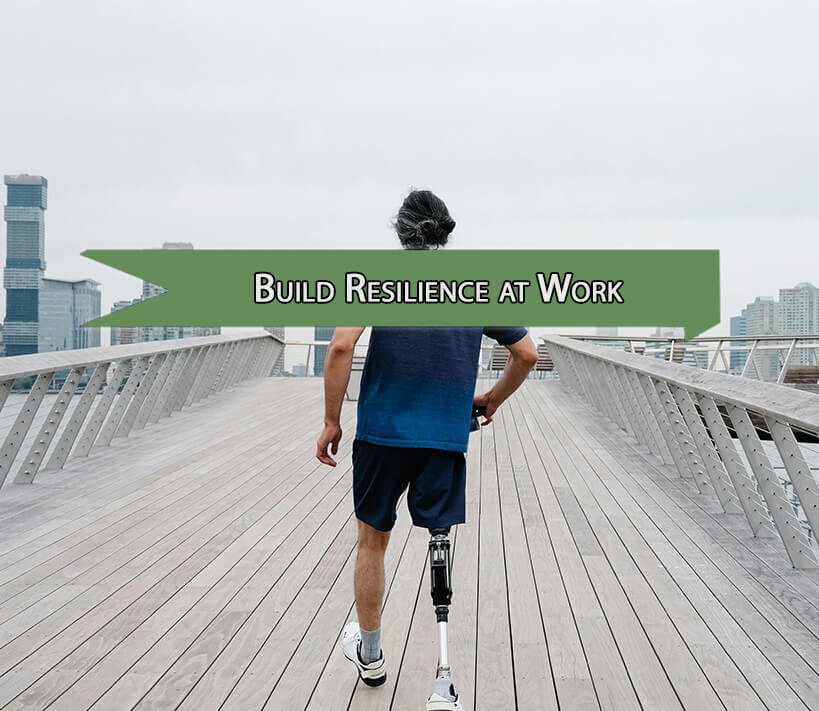Today workplaces are highly competitive and full of unexpected challenges, tight deadlines, sudden changes, interpersonal conflicts, and professional setbacks. How you respond to these pressures can make all the difference for your mental well-being and career growth. Thats where resilience comes in. It is the skill that lets you bounce back from setbacks, adapt to change, and move forward in your personal and professional life with strength and confidence. Resilience is not something you are born with, it is something that develops over time. When you adopt the proper practices and mindset, you train yourself to become emotionally flexible, mentally strong, and better equipped to handle difficult situations and stress. In this blog, we will discuss some practical tips that can help you build resilience at work.
Resilience in Urdu
ثباتِ باطنی، حوصلہ مندی، قوتِ برداشت، یا مزاحمتی صلاحیت۔
یہ ایک ایسی خوبی ہے جس سے انسان صدموں، ناکامیوں، یا مشکلات کے بعد دوبارہ اُٹھ کھڑا ہوتا ہے، خود کو سنبھالتا ہے، اور ثابت قدمی سے آگے بڑھتا ہے۔ اس مفہوم میں یہ لفظ “ارتجاعی قوت” یا “نفس کی لچک” کے طور پر بھی استعمال ہو سکتا ہے۔
1. Recognize and Manage Your Emotions
The first essential step in building resilience is understanding your emotions. Work often presents stressful situations that can trigger frustration, anxiety, or anger. Instead of suppressing these feelings, learn to acknowledge and regulate them, your psychoaura in action. Mindfulness, journaling, and even a few seconds of deep breathing can help you stay calm and in control, all easily done right at your workplace. With greater emotional awareness, you are able to respond thoughtfully rather than react impulsively.
2. Build Strong Workplace Relationships
Social support is considered to play a crucial role in reducing stress. When strong relationships are cultivated with colleagues, mentors, and friends outside the workplace, a reliable network is provided for times of difficulty. Through these connections, emotional support, practical advice, and honest feedback are provided, facilitating professional growth and enhancing performance. Confidence is thereby regained, and progress is enabled. Isolation should be avoided; teamwork and camaraderie are regarded as key components of resilience.
3. Find the Silver Lining
It is normal to feel overwhelmed in difficult situations, but you can consciously shift your perspective. Focus on what you can control and identify the hidden lessons within each challenge. Even setbacks can bring new opportunities for growth if you look for them, allowing you to learn and develop new skills. Train your mind to notice the positive aspects, even in tough times, and you will strengthen your psychological resilience.
4. Embrace change as an Opportunity
One of the most critical aspects of resilience is recognizing that change is inevitable, especially in the workplace. Whether it is a new manager, an updated system, or a shift in job roles, change can often feel disruptive. However, it also presents a chance to grow, learn new things, and develop new skills. Instead of resisting change, approach it with curiosity and adapt with a willingness to evolve.
5. Sharpens Your Problem-Solving Skills
When you encounter challenges, do not dwell on the problem, focus on finding solutions. Resilient individuals are proactive in the face of adversity. The more you practice problem-solving, the more confident and competent you will feel when future obstacles arise.
6. Stay Flexible and Adapted
Sometimes, things do not go according to plan, and thats okay. Resilience involves the ability to adapt and pivot when necessary. If one strategy does not work, it is important to try another because flexibility allows you to navigate uncertainty with grace. This adaptability helps you keep moving forward, perform better under pressure, and maintain momentum even in unpredictable situations. Embracing change, staying open-minded, and learning from each experience strengthen your resilience and prepare you for future challenges with greater confidence and clarity.
7. Maintain Work Balance
Burnout at work is common, and it is the enemy of resilience. To avoid burnout, it is essential to take short breaks during work, set clear boundaries, and make time outside of work for activities that bring you joy. These practices are crucial for maintaining good mental health. A well-rested mind is better equipped to handle pressure and bounce back from stress. Prioritizing self-care through quality sleep, reading, exercise, hobbies, and spending time with loved ones strengthens your ability to stay resilient and perform at your best.
Conclusion
Resilience at work is not a single trait you either have or do not, it is a lifelong practice. By understanding and managing your emotions, nurturing supportive relationships, seeking silver linings, embracing change, sharpening problem-solving skills, staying flexible, and protecting your work-life balance, you steadily build a personal toolkit that keeps stress in check and fuels lasting success. As you weave these habits into your everyday routines, challenges become stepping stones, and setbacks turn into lessons; your career, and well-being, advance with renewed strength and confidence.




